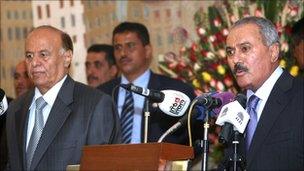Yemen's president Ali Abdullah Saleh cedes power
- Published

Yemen's President Ali Abdullah Saleh has stepped down after 33 years in power and months of protests which took the country to the brink of civil war.
He formally handed power to his deputy, Abdrabbuh Mansour Hadi, who was sworn in as head of state on Saturday.
The transfer was part of a Gulf Co-operation Council-brokered agreement.
Under the deal, Mr Hadi will serve a two-year term and oversee the drafting of a new constitution. Mr Saleh was also granted immunity from prosecution.
Aides to the former president have said that he plans to go into exile, although there have been problems finding any country that will accept him. The Associated Press quoted Yemeni officials on Monday, however, as saying that Ethiopia had agreed.
Mr Saleh becomes the fourth Arab leader to be removed from power after more than a year of mass protests in the region. He only returned to Yemen on Saturday after receiving medical treatment in the United States for injuries sustained in an assassination attempt last June.
After handing Mr Hadi the flag of Yemen at the ceremony, he said: "I hand over the banner of the revolution, of the republic, of freedom, of security and of stability... to safe hands."
He also called on the country to unite behind the new leader.
Opposition MPs boycotted the ceremony because of Mr Saleh's presence. Security forces controlled by him and his family, as well as armed loyalists, were blamed killing hundreds of people during the 11-month uprising that forced him to step aside in November.
Challenges ahead
Mr Hadi was sworn in as Yemen's new president on Sunday after an election in which he was the only candidate.
Tuesday's poll was marred by violence in the south of the country in which nine people were killed. A car bomb also exploded in Hadramawt province on Saturday, killing 26 people.
Correspondents say the violence underscores the challenges Yemen - the poorest country in the Arab world - still faces after the departure of Mr Saleh.
Mr Hadi has to tackle widespread poverty and malnutrition, a secessionist movement in the south, rebellions across the country and a fight against al-Qaeda militants.
At his swearing-in ceremony in parliament, he promised to work to bring home the thousands of internal refugees created by fighting between government troops, southern separatists, mutinous military units, and other factions.
"Today, we are laying the new basis for the peaceful transfer of power. This rule, which we hope will continue in this manner, is a demand of the Yemeni people," Mr Hadi said.
"One of the most prominent tasks is the continuation of war against al-Qaeda as a religious and national duty, and to bring back displaced people to their villages and towns," he added.
He is expected to serve a two-year term to pave the way for new parliamentary and presidential elections in 2014.
- Published25 February 2012
- Published25 February 2012